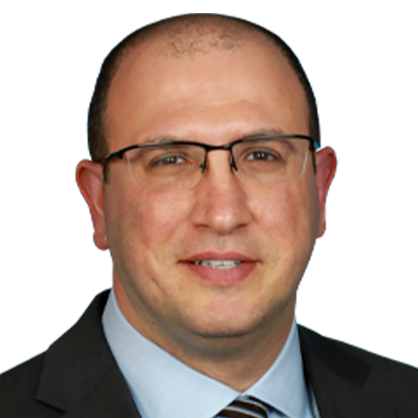Find SCP Health in booth #806
Come see us during CHEST 2023 exhibit hours to meet our clinical leaders, chat with
the recruiting team, and learn more about what makes SCP Health different.
Scalable approaches that prioritize acute patient care while achieving strategic goals.
Streamlined management and virtual care solutions to maximize efficiency.
Intensivist staffing and management, leveraging technology for quality care.
Solutions to align and integrate processes and understanding across departments.
Leverage technology to expand coverage & support both in and outside of the hospital.
Engaging with patients for proactive planning and preventative health.
 Featured
Featured
Come see us during CHEST 2023 exhibit hours to meet our clinical leaders, chat with
the recruiting team, and learn more about what makes SCP Health different.

Rodolphe “Rudy” Taby is a physician leader and hospital medicine specialist. Having graduated from Saint Joseph University School of Medicine, and after completing residency training at East Tennessee State University and a postdoctoral fellowship at The University of Texas MD Anderson Cancer Center, Dr. Taby has worked across several health care systems, including for-profit and not-for-profit organizations. In his various roles, Dr. Taby has held several medical staff and administrative leadership appointments, including Department Chair, Chief Hospitalist and Medical Director.
With a focus on Hospital Medicine productivity and quality optimization, Dr. Taby has acquired considerable experience in overseeing acute care programs along with startup initiation.
An avid outdoorsman, Rudy spends his free time hiking and cycling the Sonoran desert trails of his home state of Arizona.

Erika Gabbard brings over 19 years of experience in clinical expertise and operations management in critical care medicine. She has extensive experience in all aspects of clinical care and health care delivery models and believes passionately in empowering others to enhance patient care and outcomes.
Ms. Gabbard works to collaboratively engage teams toward a common vision, implementing large programmatic initiatives to solve for complex situations and improve overall performance. A champion for intensivist-led ICU programs, Erika believes in partnering with every part of the clinical care team to support better overall care of critically ill patients.

Felixia Colón, a native of Jacksonville, FL, brings over 25 years of health care experience to her role as a Senior Vice President with SCP Health. Ms. Colón leads SCP Health’s robust telehealth core solutions for emergency medicine, hospital medicine, and critical care medicine practices. She maintains oversight and overall accountability for her clients’ clinical performance, quality care, operational excellence, and financial stability.
Ms. Colón has served in various roles in the health care field. Her background includes development of a physician outreach program with a major health insurance carrier, managing multi-specialty and multi-site physician practices in emergency medicine, academic hospital medicine programs, private hospital medicine programs, transitional care medicine, eHealth/telenocturnist programs, and post-acute practices (SNFs/LTACs).
Ms. Colón formerly served as Senior Vice President for one of the largest independent physician practices in Texas. While there, she was responsible for the oversight of the company’s operations, contracting, business development, marketing, recruiting, and health care payment reform programs, which included CMS’ Bundled Payment Care Initiative (BPCI) Program.
A graduate of Nova Southeastern University, Ms. Colón holds a Master of Business Administration, with a concentration in Management. She earned a Bachelor of Health Administration from the University of North Florida. She is also a Fellow and active member of the American College of Healthcare Executives (ACHE). Currently, she serves as President of for the North Texas Chapter of ACHE. She has also served as an elected Board position with ACHENTX and as ACHENTX’s Vice-Chair for the Diversity, Equity, and Inclusion Committee.
Stop by the SCP Health booth to enter for a chance to win one of our fabulous prizes:




SCP Health partners with clinicians to improve the overall clinician experience and patient outcomes by working to reduce administrative burden, creating a balanced work environment, and evolving how medicine is delivered.
As a physician-led organization, we provide holistic support and guidance for clinical teams, matching passions with practice, preserving clinician autonomy, and aligning operational expectations with clinical realities.
Learn More"SCP is very big on making sure that we’re giving quality health care, not just filling a shift."
Margaret MacMillan, MD
"I really do like that SCP is physician-led. It never seems to be corporate edicts that come down. There’s always a thought process to it and a reason behind it. It is definitely a lot more straight forward and very clinician- and patient- driven."
Foster Kordisch, MD
“One of the great things about working with SCP Health is that they allow us to practice autonomously. So what that means is that a lot of the administrative burden, a lot of the data gathering and calculations, that’s done by the SCP team. By having that done, we’re now free to practice medicine again."
Matthew Meigh, MD
states
clinical programs nationwide
clinicians
patient encounters

SCP Health's 2022 Annual Review details our newly expanded portfolio, quality performance metrics and reports, and nation-wide health care advocacy opportunities.
Q&A with Erika Gabbard, DNP, RN, CCNS, CCRN-K
When I talk to critical care physicians, nurse practitioners, and physician assistants, I am always struck by how important it is to walk through how we design protocols and training to ensure quality care delivery, how we integrate across departments, and how we provide administrative support.
What intensivist clinicians care about at the end of the day is the work they are doing to drive patient care, to help their patients, and that’s what SCP Health is focused on as well.
In a very real and meaningful way, intensivists impact patients on a global scale. There’s a day-to-day impact that they have on the patient who is presenting organ dysfunction and demise, by identifying and treating it, but that’s only one part of the impact.
A huge part of the intensivist impact has to do with the family and our integration with them. When patients come into the ICU, they and their families are often at the most vulnerable point of their lives. They may be on the precipice of dying, are so critically ill, or have a long-term, chronic illness, but it also could be someone who was previously healthy and now has this terrible thing going on and they have children, parents, siblings, spouses, etc.
Intensivists have to be able to connect with families and meet them where they are, and that is a huge component of critical care medicine, particularly in palliative care, where you have to navigate tough conversations and intense feelings very, very well.
Intensive care requires huge interdisciplinary involvement and engagement. They are one player on a very large team that must integrate with pharmacy, respiratory therapy, bedside nursing, case management, physical therapy, occupational therapy, palliative care, etc., to help manage the patient along the continuum of health and healing or even dying.
SCP isn’t a staffing company, and it isn’t a locums company. We are building and designing critical care programs that work for specific sites in a way that sets us apart from our competitors, including offering the necessary training and oversight to ensure the critical care clinical team is able to deliver quality care to patients with the highest acuity.
We also focus on finding clinicians who understand that it’s not just the technical skills that make a phenomenal clinician, but it’s also the interpersonal skills – how you receive and relay information, and how you collaborate across units. We believe strongly in fostering great relationships across the various service lines at hospitals. We go to the intensive care patients in the emergency department instead of waiting for them to come to us, help across the hospital for emergencies and code blue coverage, and consult if patients need procedures.
Critical care nurse practitioners and physician assistants are seeing anywhere from six to eight and up to ten patients, depending on the skill set, level of expertise, and the acuity of the patients.
Often what drives NPs and PAs to critical care is the ability to impact the management of the patient and expand their skill set to learn the art of medicine, including doing procedures such as intubating patients, putting in central lines, and more, depending on their scope and the level of training.
We offer training to nurse practitioners and physician assistants help them become procedural experts, including a simulation course where they receive both didactic and hands on training in each skill set to be able to learn the proper methodology for inserting lines and integrating, followed by a minimum of four months of direct clinician-to-clinician training. During that onboarding period, they’re becoming procedural experts, learning how to manage patients and all the different types of comorbidities and clinical conditions, as well as how to document to ensure the highest level of quality and accuracy.
Leaning on their extensive training, we enable nurse practitioners and physician assistants to function at the highest scope as critical members of physician-led teams. Often, we come into hospitals and these roles are functioning as scribes, they aren’t doing a lot of management or procedural components and their delineation of privileges is minimal. In response, we build and design all that so every member of the clinical care team, including physicians, can practice at the highest level of their training.
We provide comprehensive support to include quality and clinical management, as well as everything needed for billing and coding for their operational schedules.
In addition to standard staff physician and medical director roles, we also have a full-time, critical care, traveling team. The members of this team are rock star clinicians – intensivists, nurse practitioners, and physician assistants – and they are deployed to new sites to help launch programs.
This team provides a strong sense of stability and leadership from the start, providing extensive amount of training and partnering with hospital care teams to really drive processes from that quality perspective.
Overall, SCP believes strongly in an integrated approach to medicine, and facilitates working across departments to support critical care units in delivering the best possible high-acuity care to patients.
“The ICU is a critical component of the hospital, providing care to the sickest patients. Today’s environment demands a new approach and mindset when it comes to the ICU, one that combines the strategic thinking of the C-Suite with the clinical and operational skills of a clinician.”
– Erika Gabbard, DNP, RN, CCNS, CCRN-K
Download The Whitepaper